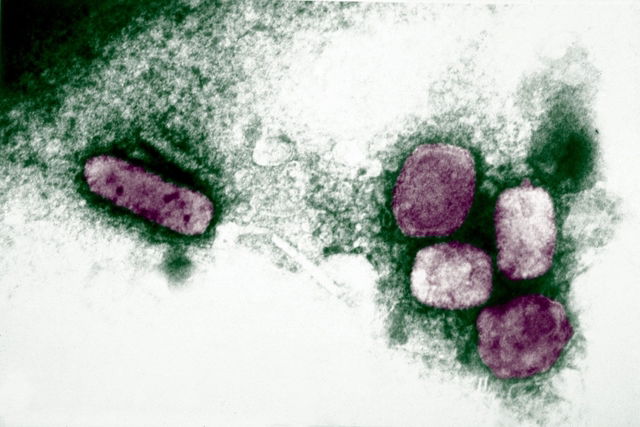Monkeypox is a rare illness caused by a Orthopoxvirus type virus that is typically found in rodents. Although it is not common, monkeypox can affect humans and cause symptoms like chills, muscular and back pain, fatigue and the appearance of blisters or lesions on the skin.
The first cases of monkeypox were first identified in 1958 in a group of monkeys, which gave this condition its name (even though it is more common in rodents). The first case of monkeypox in humans was identified in 1970.
If you notice any signs or symptoms of monkeypox, you should proceed to the hospital for a diagnosis, as this will help to prevent further transmission to other people and allow for the initiation of treatment. Treatment is usually at managing symptoms with medication.

Monkeypox symptoms
The first symptoms of monkeypox are:
- Blisters and skin wounds
- Fever
- Chills
- Headache
- Muscular pain
- Fatigue
- Back pain
These symptoms usually emerge 5 to 21 days after initial contact with the virus and can last for 14 to 21 days.
Transmission of monkeypox
Monkeypox is transmitted from person to person through respiratory secretions that are released in the air from coughing or talking. However, for the virus to be transmitted to another person, two people must be close to each other for a prolonged period of time.
In addition, transmission can also occur through direct contact of the discharge released by the monkeypox lesions, or through contaminated objects. Lesions in the genital area can also increase the risk of transmission through sexual contact.
Transmission of this type of pox virus can also occur through animal vectors like rodent bites, consuming contaminated or uncooked meat, and/or contact with the discharge or blood of an infected animal.
Treatment options
Normally a specific treatment is not necessary to treat monkeypox, as the symptoms usually disappear within a few weeks. In some cases, however, the doctor may prescribe medications to treat symptoms more quickly.
Even though it is a rare disease, it is important to go to the hospital for monitoring and to prevent further transmission if you have symptoms of monkeypox.
Medications that have been approved for the treatment of smallpox may be prescribed for monkeypox. Some examples include Tecovirimat e o Brincidofovir. Nonetheless, these medications have not been tested in infected patients, and therefore are only used to control a potential outbreak.
How to prevent it
Some recommended prevention tips include:
- Avoiding close proximity with people diagnosed with monkey pox
- Avoid touching monkeypox lesions or coming in contact with the clothes or personal objects of those with signs and symptoms of monkeypox
- Thorough hand hygiene with soap and water
- Using masks
In addition, this illness can also be transmitted from animals to people, although this is rare. You are advised to consume meat that is well-cooked and to avoid contact with wild animals, particularly rodents, as they can be infected with monkeypox or other infectious agents.
Vaccine information
Vaccines are also a useful tool for protecting yourself against monkeypox. According to the World Health Organization, mass vaccination against monkeypox is not possible, as there are not enough vaccines for the total global population.
Currently, the vaccines that are approved for use in the USA, Canada, UK and/or Europe are:
- Jynneos/ Imvamune/ Imvanex, which is given in 2 doses, 4 weeks apart. This vaccine can also be administered up to 4 days after contact with the virus (in these cases, only 1 dose is recommended). Vaccines that are administered 5 to 14 days after initial que exposure can still reduce symptoms, but they may not stop the development of the disease in the body.
- ACAM2000, which is given as a single dose. It is not recommended for those with a history of a weakened immune system, atopic dermatitis, eczema, cardiac disease, or ocular diseases. It should also not be administered to pregnant women.
These vaccines are not recommended for all people, and instead, should be administered to those who are at higher risk for exposure to monkeypox, including healthcare workers and people who work in laboratories or are researching Orthopoxvirus.
The vaccine efficacy against the current outbreak is still not totally known, although it is still recommended as an important prevention measure.
